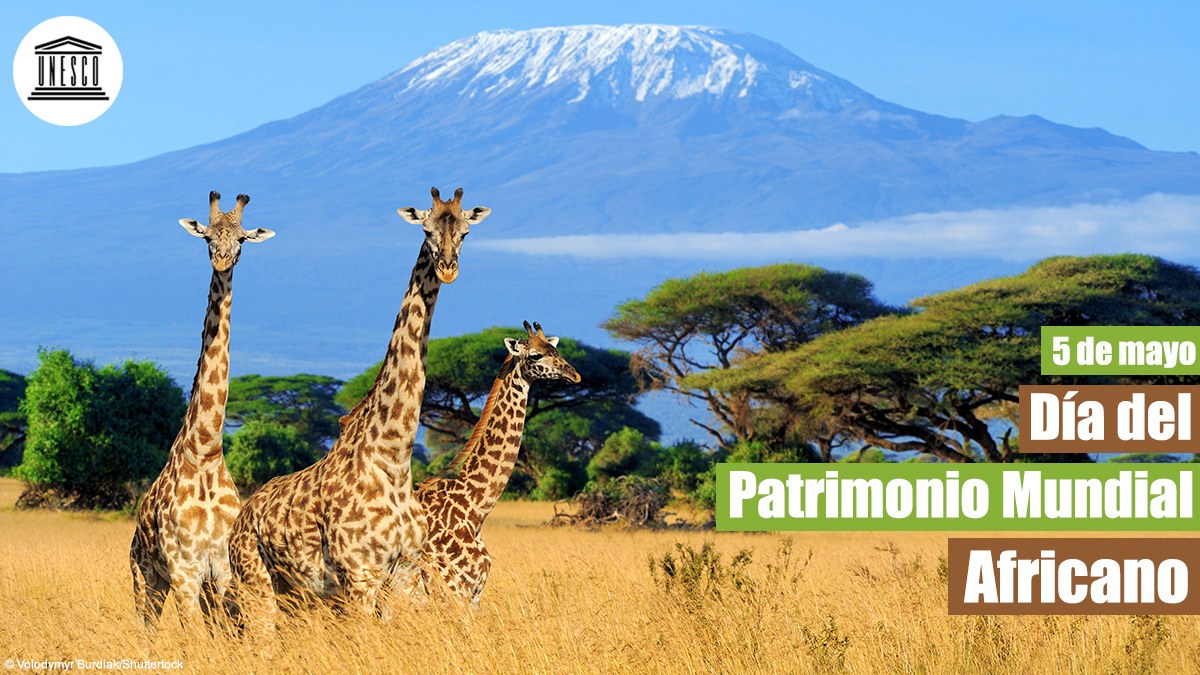
DÍA MUNDIAL DEL PATRIMONIO AFRICANO
Hoy, 5 de mayo, se celebra el Día Mundial del Patrimonio Africano. Esta efeméride se celebra desde el año 1992 a raíz de un decreto de los Estados Miembros de la UNESCO.
Uno de los principales objetivos de este Día Mundial es dar a conocer a todas las personas del planeta, en especial al pueblo africano, el inmenso y valiosísimo patrimonio cultural y natural de este continente.
El Continente Africano se caracteriza por sus grandes dimensiones, en el cual habitan más de 1.200 millones de personas, siendo en su gran mayoría, gente joven. Es el continente que mayor población alberga. En esta zona también habitan los animales más grandes y salvajes del mundo, como el león, el elefante, el rinoceronte y el búfalo. Además, cuenta con el desierto del Sahara, considerado el más grande del mundo.
En África se encuentran grandes monumentos naturales que la UNESCO ha declarado como Patrimonio de la Humanidad. Algunos de ellos son:
- Las Cataratas Victoria: se ubican entre Zambia y Zimbawe y es considerada la mayor cascada de agua del mundo.
- Bosque tropical de Atsinanana en Madagascar: en este bosque cohabitan fauna y flora muy exótica que convierten al lugar en único.
- Namib Sand Sea en Namibia: se trata de un desierto formado por fósiles y dunas.
- La ciudad de Cártago en Túnez: fundada por los antiguos fenicios, contiene sitios ancestrales como el anfiteatro o los conocidos baños públicos.
Además del Patrimonio Natural de este continente, África también cuenta con un patrimonio material e inmaterial que hace que su cultura sea única, como los bailes, festividades o rituales.
Por ello, la UNESCO expresa su compromiso de buscar alianzas y aunar esfuerzos para lograr todas las transformaciones necesarias que permitan preservar la riqueza de la cultura africana.
__
WORLD AFRICAN HERITAGE DAY
Today, May 5, is World African Heritage Day. This event has been celebrated since 1992 as a result of a decree of the Member States of UNESCO.
One of the main objectives of this World Day is to make known to all the people of the planet, especially the African people, the immense and valuable cultural and natural heritage of this continent.
The African continent is characterized by its large size, which is inhabited by more than 1.2 billion people, the vast majority of whom are young people. It is the continent with the largest population. This area is also home to the largest and wildest animals in the world, such as the lion, the elephant, the rhinoceros and the buffalo. In addition, it has the Sahara desert, considered the largest in the world.
Africa is home to great natural monuments that UNESCO has declared as World Heritage Sites. Some of them are:
– Victoria Falls: located between Zambia and Zimbabwe and is considered the largest waterfall in the world.
– Atsinanana Rainforest in Madagascar: in this forest cohabit very exotic fauna and flora that make the place unique.
– Namib Sand Sea in Namibia: it is a desert formed by fossils and dunes.
– The city of Carthage in Tunisia: founded by the ancient Phoenicians, it contains ancestral sites such as the amphitheater or the well-known public baths.
In addition to the Natural Heritage of this continent, Africa also has a tangible and intangible heritage that makes its culture unique, such as dances, festivities or rituals.
Therefore, UNESCO expresses its commitment to seek partnerships and join efforts to achieve all the necessary transformations to preserve the richness of African culture.
__

